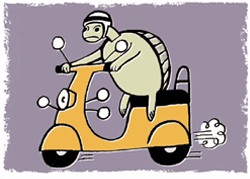
Let us discuss an old folk story, the one about the hare and the tortoise.
1) We know that there was a race in which, slow but steady tortoise won the race while the over confident hare took a nap before the race was over.
2) Now that the hare had lost the race, he was quite ashamed to move around in the neighbourhood and was depressed. His parents got worried – naturally. They had a small discussion, there was to be another race and the clear advise was to first finish the race and then do any thing else, like taking a nap.
So there was another race and this time as you would guess, the hare won hands down. The moral of the story in this case is even more simple – Even when you are fast and talented to win a race you shall have to finish it…..and being slow and steady can win you a race, only some of the time.
3) Now it was the turn of the tortoise kid to get depressed. The kid had felt the
warm glow that comes from being successful. It was better than any TV serial, candy or a toy. His parents were deeply concerned. The mummy tortoise came up with an idea – which to my mind was brilliant. “To win a race you must run another race, that much is for sure only this time the race track should be through the jungle river.
So there was this third race and the tortoise kid won once more. The hare was stuck at the river bank despite reaching there early.
Let us discuss this part of the story a little –
a) The parents (of the tortoise) understood that it was all about winning the race and not about running. In life situations too it is more important to be successful in a chosen vocation and it is not about scoring 100 marks in maths or for that matter in any other subject all the time.
b) One can not win , from a point of weakness. So in our story just running to win the race was seen as , not possible. Weaknesses generally can not be converted to strengths, not easily any way. By hard work and practice the tortoise could never hope to run faster than the hare - so when hard work will not work a change of strategy can work. This is the key to good parenting , to be able to tell your child when to work hard and when to work on something else.
c) To be good and successful you have to know your strengths and plan the race of life accordingly and run it till the finish line.Swimming was definitely a strength for the tortoise and so the race course was tailored.
The greatest positive influence we adults can have on our children is to
i) help them in identifying their strength areas.
ii) Develop the strengths into core competencies.
iii) Encourage them to choose their vocation according to their core competencies.
By the way, there are (at least ) two lessons from the cricket world cup 2003.
Pointing foxed Ganguly when he told the press that “Indian seamers could pose a problem”. So Anil Kumble was not taken in the team.( that is what my friends and I think). Please recall how tantalizing it was to discuss the fate of Sri Lanka - Australia semifinal, because of Australian weakness in playing spin bowling. Sri Lanka lost the match because of their own stupid batting. It is important that children understand strategy, and develop thought flexibility. Lateral thinking process is one great idea.
The second important lesson is that, no amount of worshipping , numerology left handed captains alternating with right handed captains lifting the cup etc will win us the cup. We have to play better cricket, that is it. You must discourage superstition in your child always.
Thank you very much.


